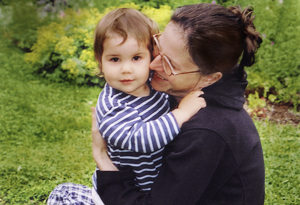Finding Faith After a Brush with Tragedy

The author with daughter Birdy in the summer of 2004.
When a faith-challenged mother has a brush with tragedy, suddenly it all makes sense.
"Is she sad?" My 4-year-old gazes up at a mother cradling the lifeless body of her only son. Our Lady of Sorrows. Something squeezes in my chest like a fist. "Yes," I whisper back. "She's sad."We're in a church in Florence, beholding the magnificent frescoes. Close friends, here on a year's sabbatical, have invited us to their grandissimo appartamento—the trip of a lifetime! But our joyful, Chianti-fueled reunion has gone horribly wrong. At this very moment, 20 minutes away by taxi, in the Ospedaliero Careggi, our friend Samara is trying not to give birth to a baby that's due in February. It's October.
I am not religious. I am what you might call spiritual, but I grasp after this spirituality as awkwardly as a person picking buttercups with oven mitts on. We have so much to be thankful for—our friends and family, our health, our very lives—and I never know exactly how best to convey my gratitude. Mostly it finds expression in the way my eyes sometimes fill with tears when I'm serving my family oatmeal, and in the sudden blurting of the words "I'm so lucky," while my children, who are too young to roll their eyes, smile at me. Every evening we hold hands for a moment before dinner, and when we hear the kids say the word "blessings" in their high, clear voices, we know that we are blessed. Although when my atheist parents are visiting, their visible shock at this ritual might lead you to imagine that we're Hare Krishna-ing around the table with tambourines. My father sighs, puts down his forkful of lasagna to hold the children's soft fingers in his own. "Is there more? Or can we maybe eat already?"
My parents' good marriage provided passion enough for one household, and its context felt like the setup for a bad joke: What do you get when you cross a nonobservant Jew with a disgruntled Catholic raised by skinny, malevolent nuns? You get matzoh topped with cream cheese and bacon—that's what you get. You get abundant love, ardent but secular. And maybe you get a daughter with a secret fascination with religion.
Religious illumination came to me less like a beam of light through the clouds than like the molten, shifting shapes inside a lava lamp. I devoured the '70s bible Are You There God? It's Me, Margaret, in which I learned that Our Heavenly Father had His holy hand in such tween concerns as the proper pronunciation of menstruate (men-stroo-ate?) and the proper fitting of a training bra. I wondered about prayer: Did it feel like blowing out birthday candles and wishing for the beauty parlor Barbie head, the one with real pretend makeup, that seemed too frivolous to ask for aloud? I squinched my eyes shut. "Please God, let me get my period," I prayed, following Margaret's lead. It felt phony and embarrassing.
I read Anne Frank and the Elie Wiesel trilogy, guiltily fascinated by the magnitude of the suffering. I wanted to be more Jewish. I wanted to go to Hebrew school like many of my friends, but I might have been more impressed by their disco Bat Mitzvahs and wrists full of semiprecious bracelets than by anybody's knowledge of the Torah. This was around the same time that I wrote a school report on stained glass windows, and sat alone in a church with my colored pencils until I got a major case of the creeps; I tried to imagine that these creeps were really the fingers of God, reaching into my unbelieving soul.
"We started our family with a belief in intelligence, justice, and gratitude"
Photo: Jennifer Newman



